Plunging the Audience Into an Experience
The Courtroom, devised by Waterwell in collaboration with Fordham Law School, was performed in New York City at law schools, courthouses, and Judson Church, where I saw it. The space was transformed into a brightly lit courtroom, with lawyers preparing papers. There were no programs, just a schedule of immigration trials for the day. It was evident this would be a hearing.
When the immigration judge (Ruthie Ann Miles) entered and gave the “all rise” call, the audience stayed seated. We knew it was not for us. The focus was on Elizabeth (Kristin Villanueva), who had come to the United States legally to marry her husband and who struggled to explain why she had illegally voted in an election. Her husband (Happy Anderson) described the despair he would feel if his wife were to be deported, with or without their baby. The judge then left to deliberate.
The proceedings moved to an appeals court, where Elizabeth fought deportation. When the audience heard the “all rise” call from the three appeals judges (Kathleen Chalfant, Michael Bryan French, and Mick Hilgers), we all checked to see if anyone else was going to stand up. No one did. As Elizabeth struggled to explain why she mistakenly voted, and the main judge and prosecutor questioned what can happen when people avoid consequences by claiming they don’t know the law, our empathy for Elizabeth grew. As before, the judges then left to deliberate.
The courtroom then became a naturalization ceremony. This time when the audience heard the “all rise” call, we all stood immediately. As the requirements of citizenship were read, we obediently repeated the phrases—including our full commitment to bear arms to protect the United States and accept any other responsibilities for the security of our new country. As an audience, we had become more than courtroom observers, we were becoming new citizens. The judge acknowledged our harsh journeys that got us to this ceremony, gave a soaring tribute to our democracy, and pronounced us citizens. We saw Elizabeth joyfully embrace her husband in the front row and we applauded enthusiastically—for one immigrant’s receipt of citizenship, for the ceremony, for the judge’s beautiful vision of the American dream, and for our own sense of renewed citizenship. The judge congratulated us, closed court, and left.
The quiet energy of the experience gave us—or at least one of us—the power to speak, to take action.
At this point, we weren’t sure if the play was over. Director Lee Sunday Evans did not break the scene with bows or curtain calls. No one in the audience spoke; most of us were lost in thought. I contemplated my own family history of immigration, of America’s first African families shipped here in chains as slaves, of the lands and lives stolen from our Native American ancestors. I felt caught between the judge’s soaring vision of democracy and my awareness that Elizabeth was only one hundreds of sessions that day. The audience waited, but nothing happened.
As people began returning to their roles as audience members, an older woman in the front row went to the mic and muttered, “Still live?” Her test tap echoed around the room and caught our attention. She asked: “Did we just mouth the words of citizenship and pledge to bear arms without thinking?” She reminded us of America’s current military actions right now in places like Yemen and asked, “Do we really want to take up arms to defend these actions?”
The audience burst into applause. I went over to the woman and asked: “Are you an actress? A plant?” No. Just an audience member who figured the mic might still be active. She had spoken from her heart.
On our way out, programs were distributed, and we learned the judge was an actual judge. Flyers covering a table invited us to sign petitions and join organizations to protect hundreds of other immigrants. The play had worked the magic of theatre: without any theatrics or role playing instructions, our time in the courtroom transformed us from audience members into court observers then into immigrants with deep empathy for Elizabeth’s legal journey. The quiet energy of the experience gave us—or at least one of us—the power to speak, to take action.

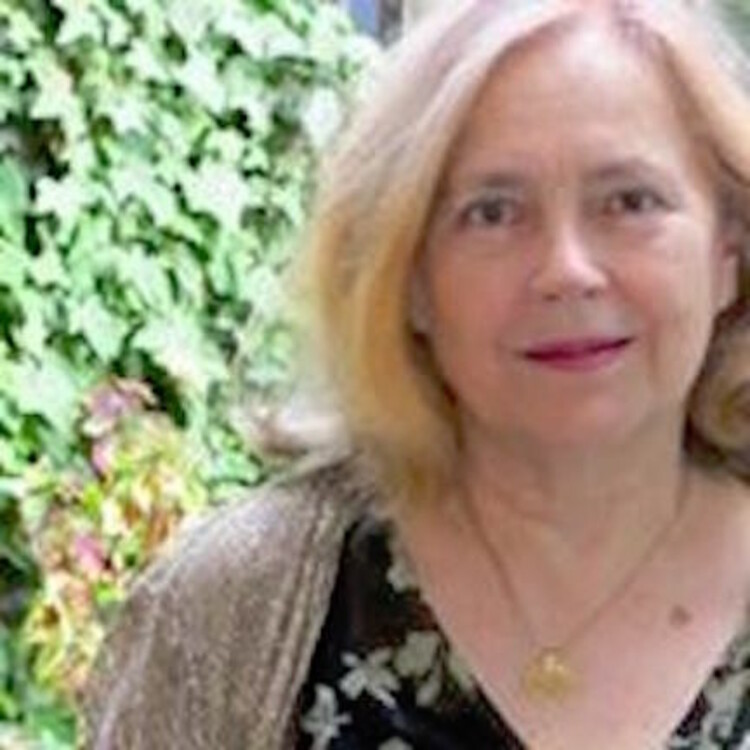
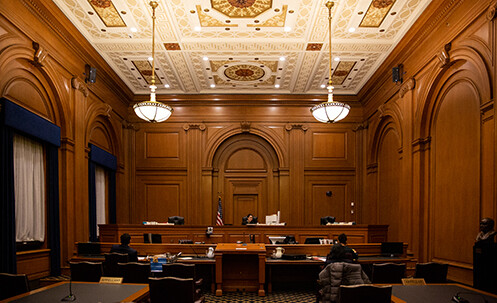
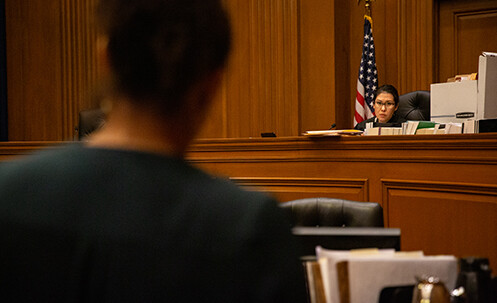
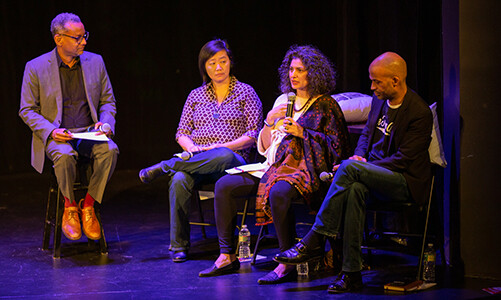
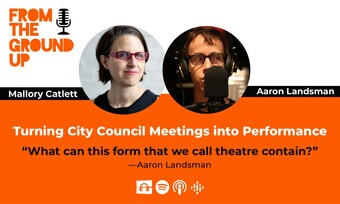



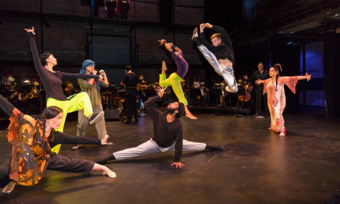


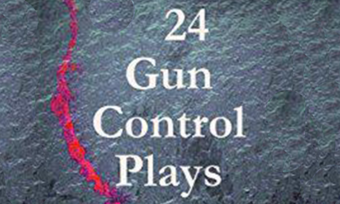

Comments
The article is just the start of the conversation—we want to know what you think about this subject, too! HowlRound is a space for knowledge-sharing, and we welcome spirited, thoughtful, and on-topic dialogue. Find our full comments policy here
Related Howlround: https://howlround.com/theatri…
ANNOUNCING:
Two more performances of The Courtroom
"Best of Theater 2019!" The New York Times
Two More Performances of the Courtroom ni Feb-Mar 2020:
The Lucille Lortel Theatre Foundation 121 Christopher Street Wednesday, February 12: 7p
Symphony Space 2537 Broadway Monday, Mar 9, 7 pm
”The Courtroom” is back in NYC this week:
Cheek in The Courtroom. Photo by Maria Baranova.
This Thursday:
Peter Francis James Joins The Courtroom!
We are pleased to announced that Drama Desk-Winner Peter Francis James will be joining us for the next performance of The Courtroom this Thursday, November 21 at 7p!
Just coming off of his Broadway turn in Hilary & Clinton, Peter will be playing Immigration Judge Craig Zerbe in the deportation proceedings of Elizabeth Keathley.
Joining Peter Francis James, the cast on November 21 will include Happy Anderson,Michael Braun, Kathleen Chalfant,Hanna Cheek, Mick Hilgers, Linda Powell, Pat Ravey and Kristin Villanueva.
THE COURTROOM
A Re-enactment of Deportation Proceedings
Transcripts arranged by Arian Moayed
Directed by Lee Sunday Evans
Thurs, Nov 21 at 7p
Center at West Park
(Historic Presbyterian Church)
165 W 86th St
Click here for $25 Tickets
Mon, Dec 9 at 7p
The Great Hall
at Cooper Union
7 E 7th St
Click here for FREE Tickets
Listen Here!